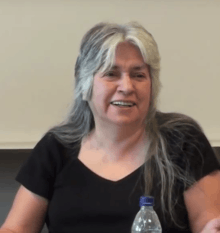Lee Maracle
| Lee Maracle | |
|---|---|
 | |
| Born |
July 2, 1950 Vancouver, British Columbia, Canada |
| Nationality | Sto:lo (Canadian) |
Lee Maracle, OC (born July 2, 1950) is a Canadian poet and Sto:lo author. She speaks out as a critic of the treatment of indigenous people by the Canadian people and she particularly highlights the issues relating to indigenous women.[1]
Early life
The granddaughter of Tsleil-Waututh Chief Dan George, Maracle was born in Vancouver, British Columbia, in 1950[2] and grew up in the neighbouring city of North Vancouver as one of the first aboriginal children to be allowed to attend a normal state school.[3] She dropped out of school and went to California where she did various jobs that included producing films and doing stand-up comedy.[1] She returned to Canada and attended Simon Fraser University.[2] She was one of the first Aboriginal people to be published in the early 1970s.[1]
Career
Maracle is one of the most prolific aboriginal authors in Canada and a recognized authority on issues pertaining to aboriginal people and aboriginal literature.[3] She is an award-winning poet, novelist, performance storyteller, scriptwriter, actor and keeper/mythmaker among the Stó:lō people.
Maracle was one of the founders of the En’owkin International School of Writing[1] in Penticton, British Columbia and the cultural director of the Centre for Indigenous Theatre in Toronto, Ontario.
Maracle has given hundreds of speeches on political, historical, and feminist sociological topics related to native people, and conducted dozens of workshops on personal and cultural reclamation. She has served as a consultant on First Nations’ self-government and has an extensive history in community development. She has been described as "a walking history book" and an international expert on Canadian First Nations culture and history. Her views (as broadcast 18 May 2014 on CBC Radio) are that the Canadian people (not the government, because Canada is an "illegitimate state") should accept responsibility for cultural genocide and the theft of the whole land from its aboriginal inhabitants.[3]
Maracle has taught at the University of Toronto, University of Waterloo, Southern Oregon University and has served as professor of Canadian culture at Western Washington University. She currently lives in Toronto, teaching at the University of Toronto First Nations House. She was the writer-in-residence at the University of Guelph.[1]
In 2017, Maracle was presented the Bonham Centre Award from The Mark S. Bonham Centre for Sexual Diversity Studies, University of Toronto, for her contributions to the advancement and education of issues around sexual identification.[4]
Bibliography
Fiction
- Sojourner's Truth and Other Stories – 1990
- Sundogs – 1991
- Ravensong – (Press Gang Publishers) 1993
- Daughters are Forever – 2002
- Will's Garden – 2002
- First Wives Club: Coast Salish Style – (Theytus Books Publishing) 2010
- Celia's Song. Toronto, ON: Cromorant Books. 2014. ISBN 978-1-77086-416-0.
Non-fiction
- Bobbi Lee: Indian Rebel – 1975 (revised 1990)
- I am Woman: A Native Perspective on Sociology and Feminism – 1988; Press Gang Publishers 1996
- Oratory: Coming to Theory – 1990
- My Conversations with Canadians – 2017
Poetry
- Bent Box – 2000
Collaborations
- My Home As I Remember
- We Get Our Living Like Milk from the Land
- Telling It: Women and Language Across Cultures – 1990 (with Betsy Warland, Sky Lee and Daphne Marlatt) Press Gang Publishers
- Reconciliation: The En'owkin Journal of First North American Peoples Vol 13
Anthologies
- Gatherings, The En'owkin Journal of First North American Peoples Vol 2
- Gatherings, The En'owkin Journal of First North American Peoples Vol 3
- Gatherings, The En'owkin Journal of First North American Peoples Vol 10
- Satin Shorts
- Returning the Gaze: Essays on Racism, Feminism and Politics
- Giving Back/First Nations Perspective on Cultural Practice
- Bertha
- An Anthology of Canadian Native Literature in English
- Frictions: Stories by Women
- First Peoples Voices
- Children of the Dragonfly
- Our Bit of Truth: An Anthology of Canadian Native Literature
- Reinventing the Enemy's Language: Contemporary Native American Women's Writings of North America
- First Fish, First People: Salmon Tales of the North Pacific Rim – 1999 (American Book Award 1999, Before Columbus Foundation)
- 75 Readings Plus
- Making a Difference: Canadian Multicultural Literature
Essays and criticism on the writing of Lee Maracle
- Berry Brill de Ramirez, Susan (1999). Contemporary American Indian literatures & the oral tradition. Tucson: University of Arizona Press. ISBN 9780816519576.
- Horne, Dee (1999). Contemporary American Indian writing: unsettling literature. New York: Peter Lang. ISBN 9780820442983.
- Leggatt, Judith (December 2000). "Raven's Plague: pollution and disease in Lee Maracle's "Ravensong"". Mosaic: An Interdisciplinary Critical Journal, special issue: HYGIEIA: Literature and Medicine. University of Manitoba. 33 (4): 163–178. JSTOR 44029714.
- Lew, Janey (2017). "A politics of meeting: reading intersectional indigenous feminist praxis in Lee Maracle's Sojourners and Sundogs". Frontiers: A Journal of Women Studies. University of Nebraska Press. 38 (1): 225–259. JSTOR 10.5250/fronjwomestud.38.1.0225.
- MacFarlane, Karen E. (2002), "Storying the borderlands: liminal spaces and narrative strategies in Lee Maracle's Ravensong", in Eigenbrod, Renate; Episkenew, Jo-Ann, Creating community: a roundtable on Canadian aboriginal literature, Penticton, British Columbia / Brandon, Manitoba: Theytus Books Bearpaw Pub., pp. 109–123, ISBN 9781894778084.
Notable family
- Columpa Bobb, daughter (actor-playwright-poet)
- Sid Bobb, son (actor)
- Chief Dan George, grandfather (Salish chief-actor)
References
- 1 2 3 4 5 "Lee Maracle". The Canadian Encyclopedia. Retrieved 14 April 2016.
- 1 2 "Lee Manacle". IPL.org. Retrieved 14 April 2016.
- 1 2 3 "Truth & Reconciliation: What's Next?". CBC. 16 May 2014. Retrieved 14 April 2016.
- ↑ "Decolonizing sexuality: U of T recognizes Indigenous educators and advocates for sexual diversity". University of Toronto News. Retrieved 7 July 2017.